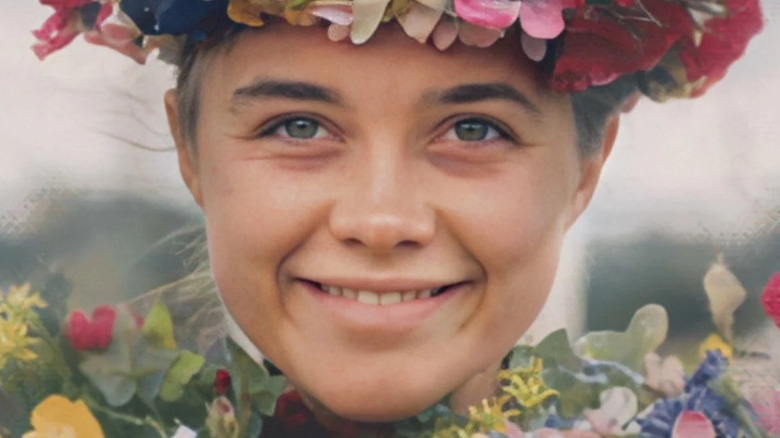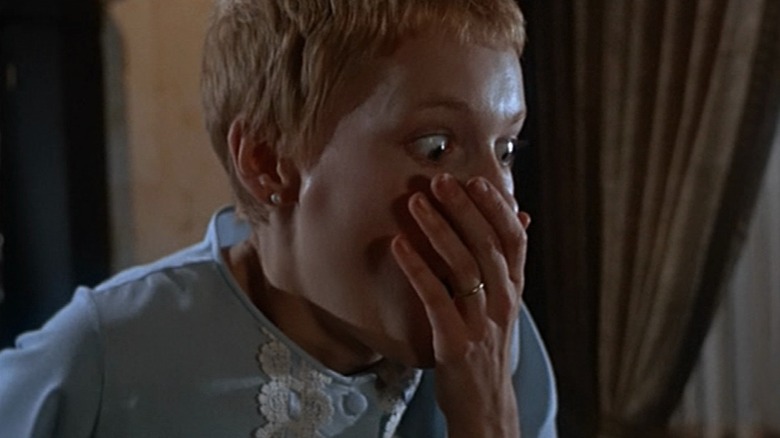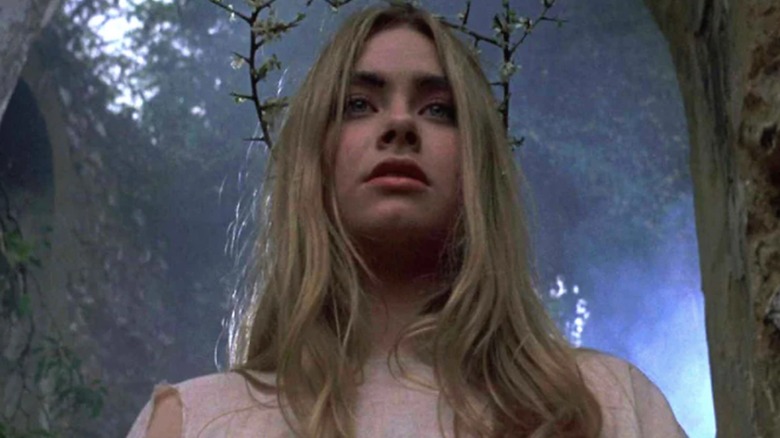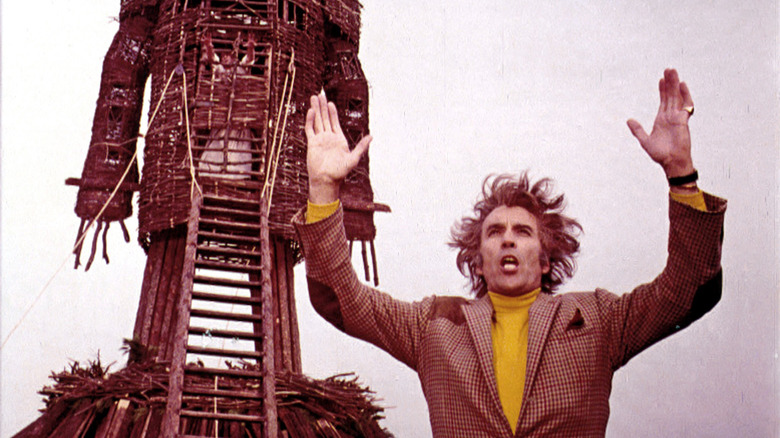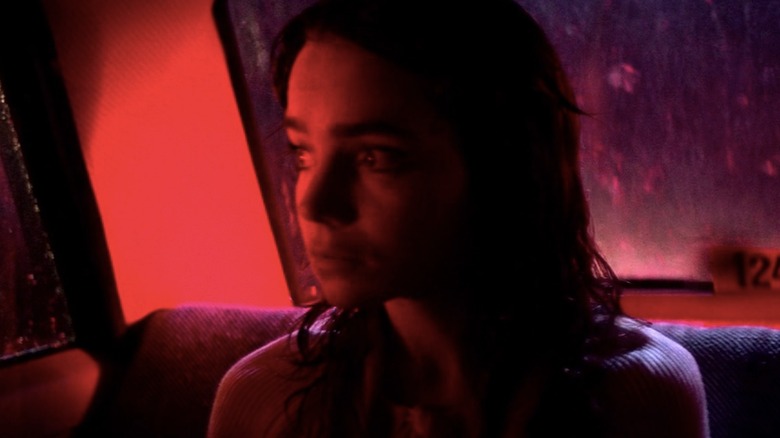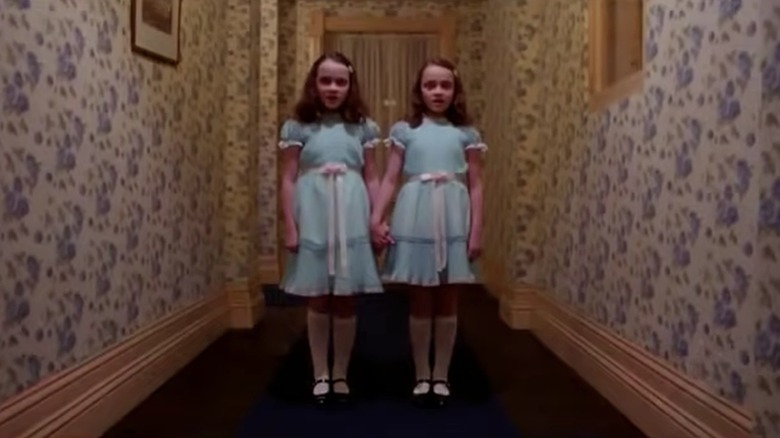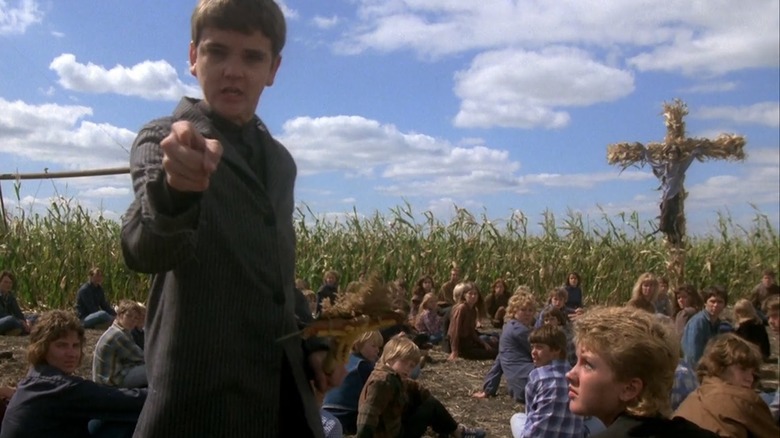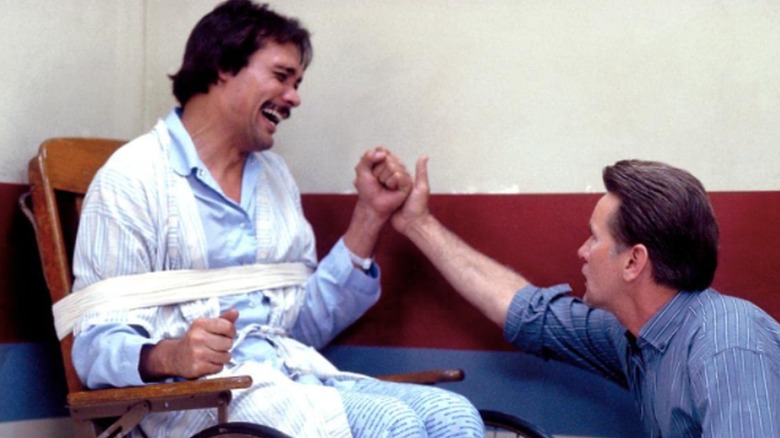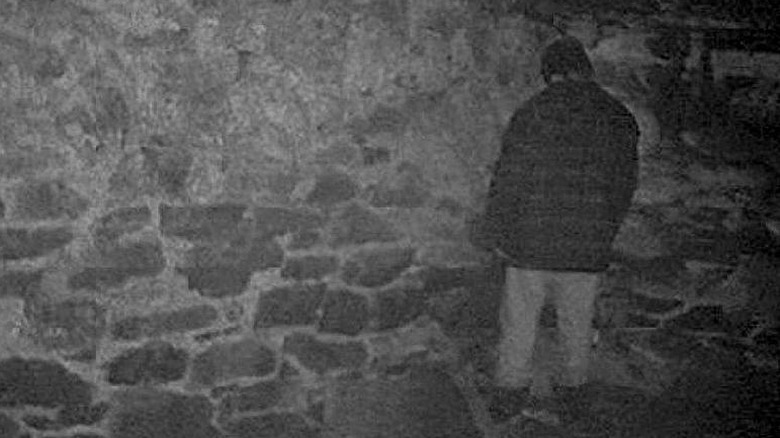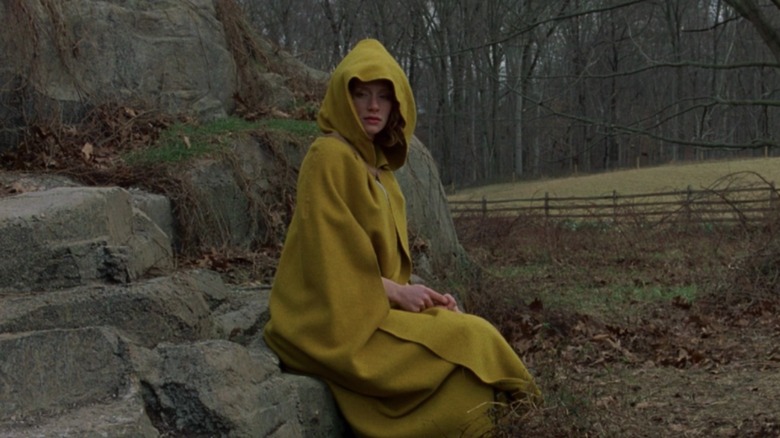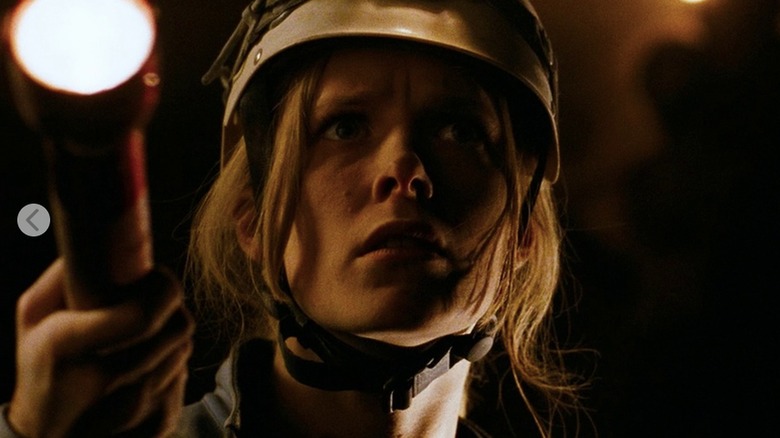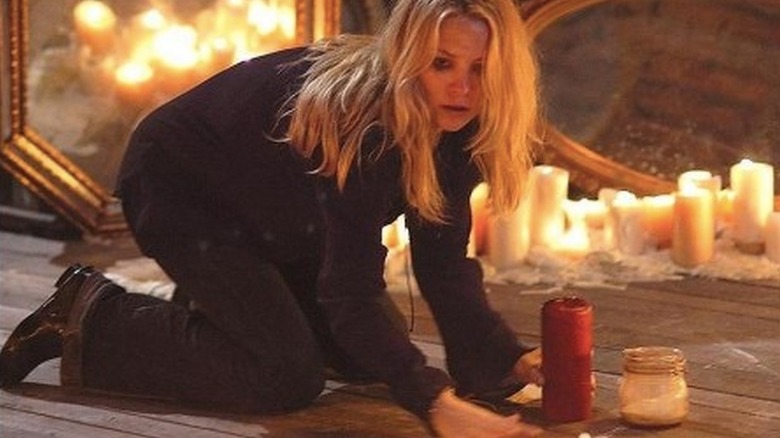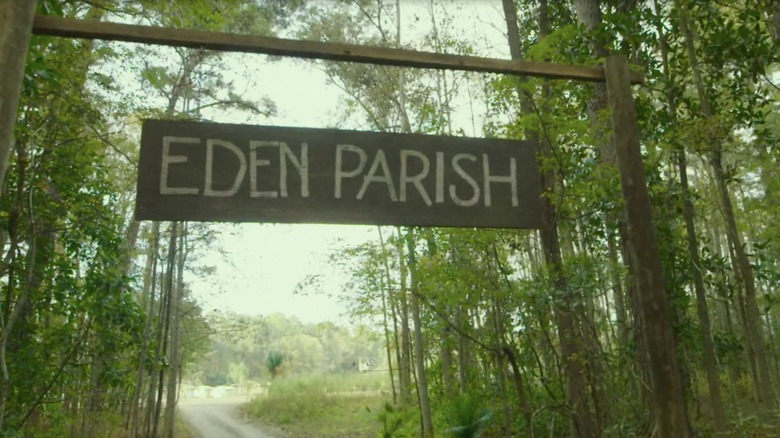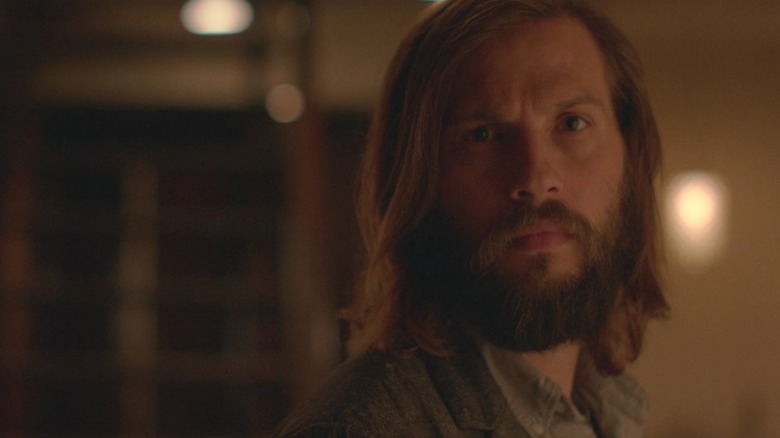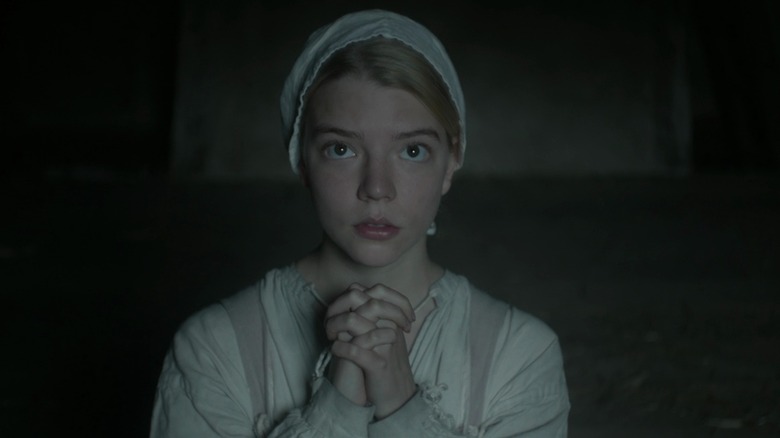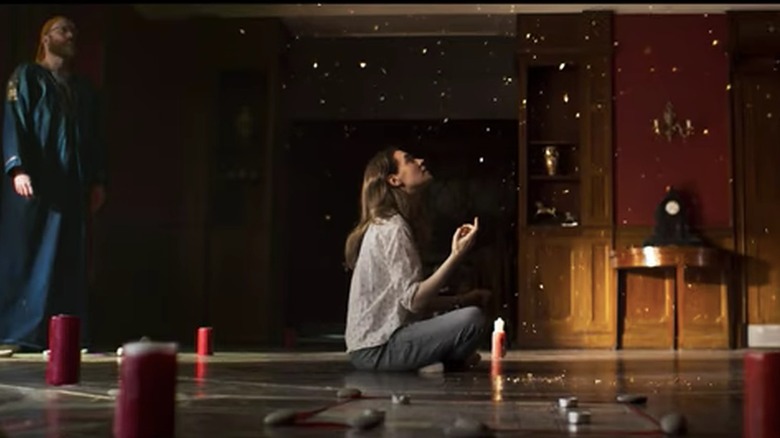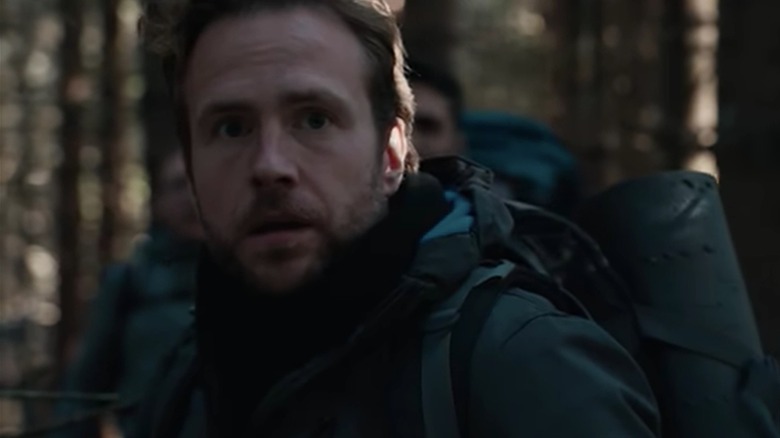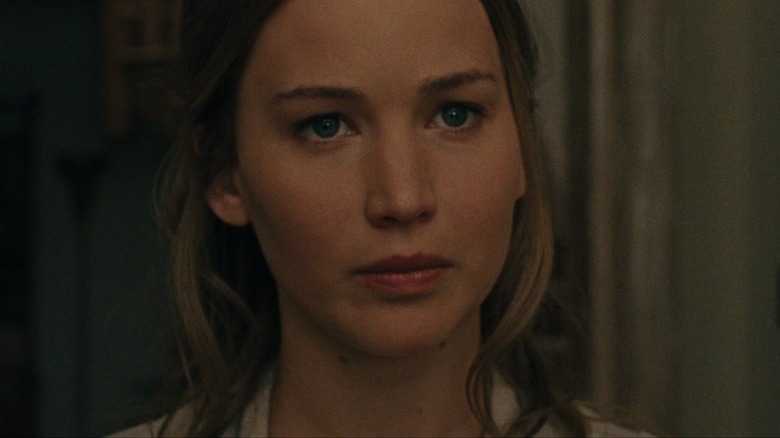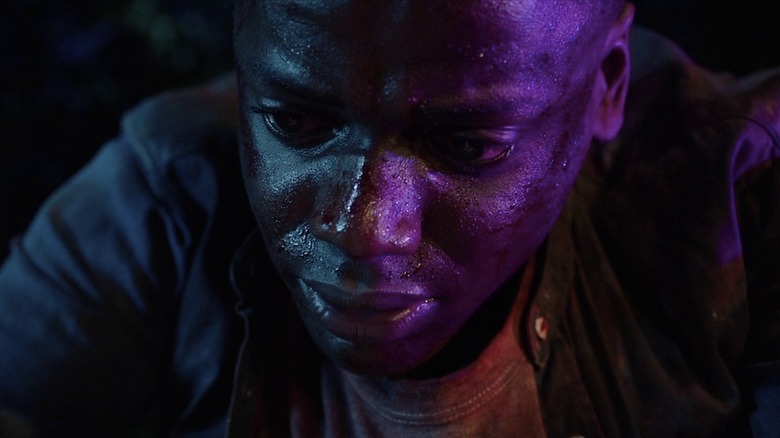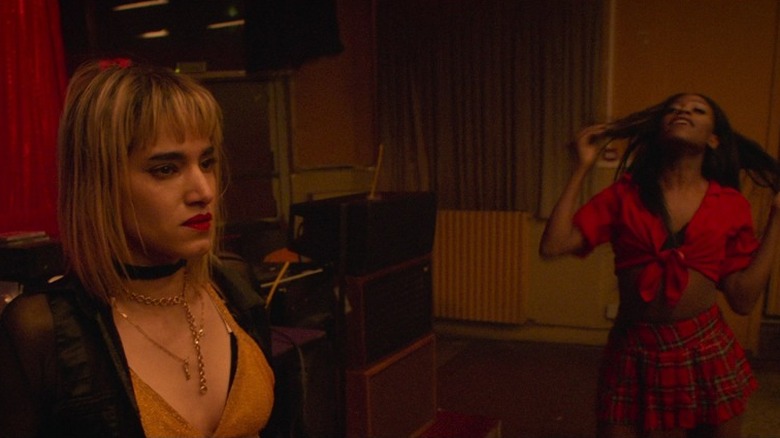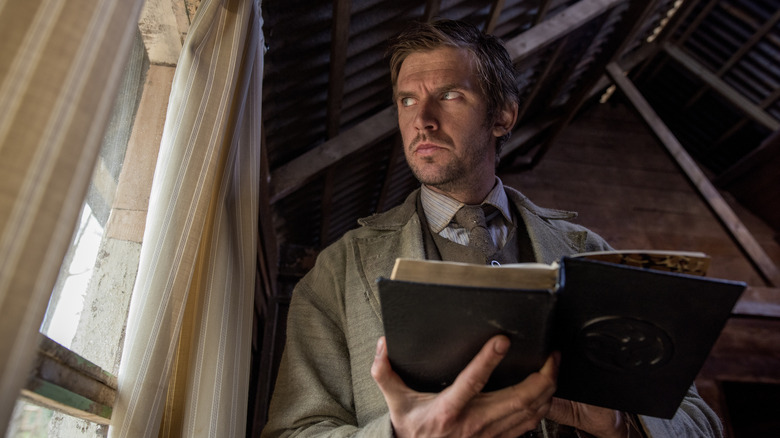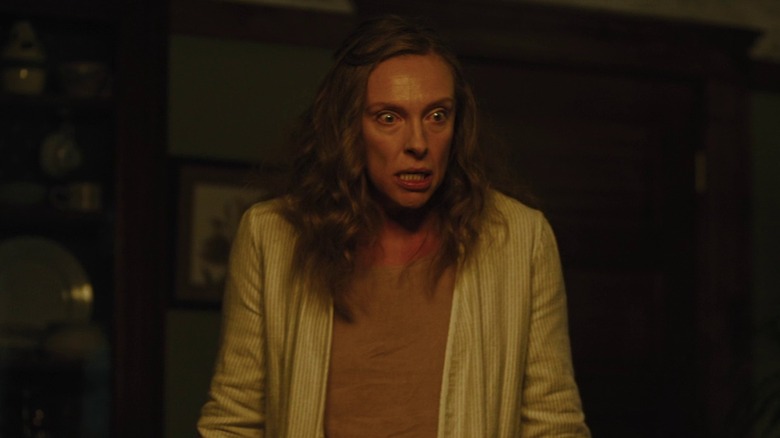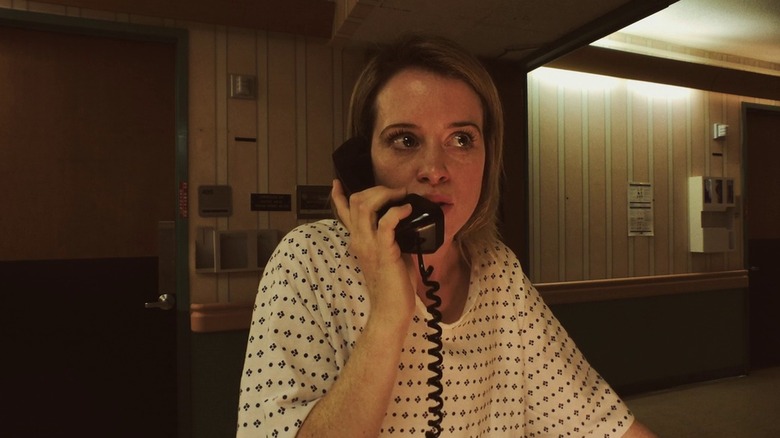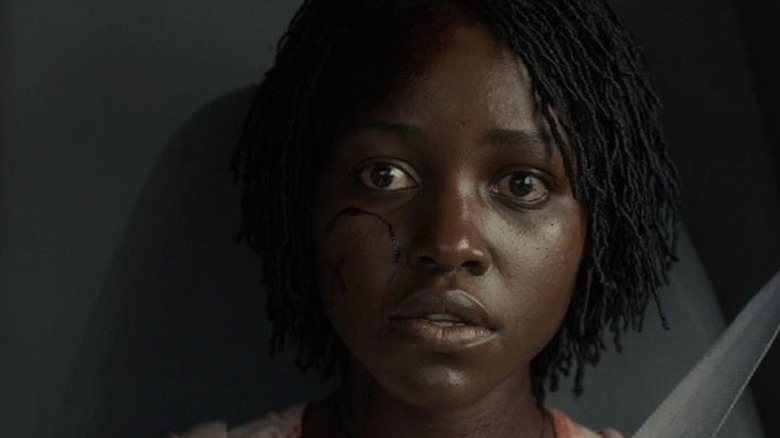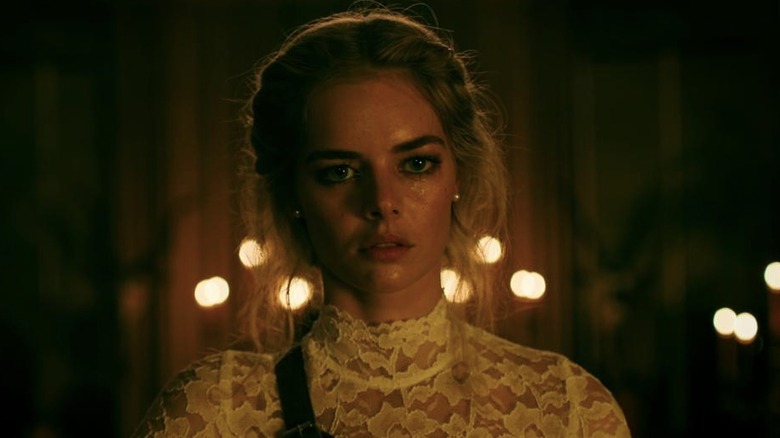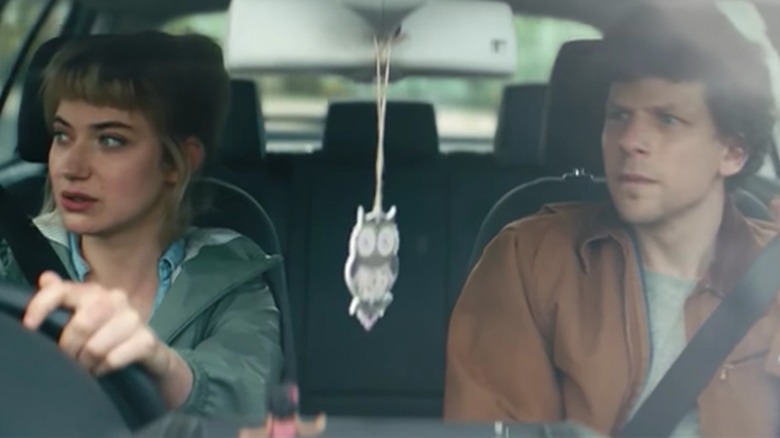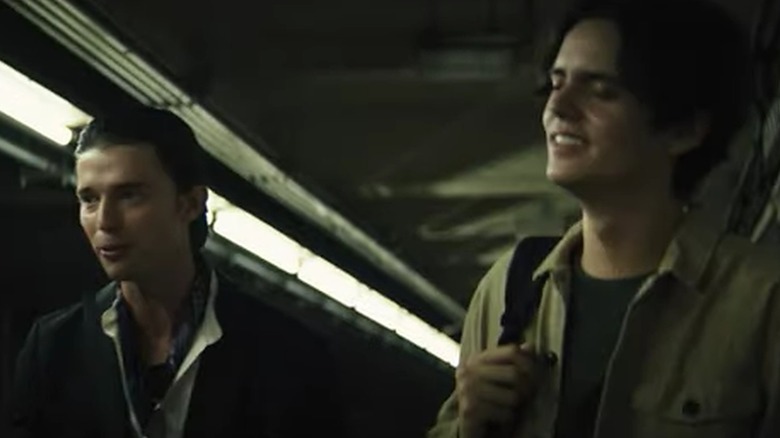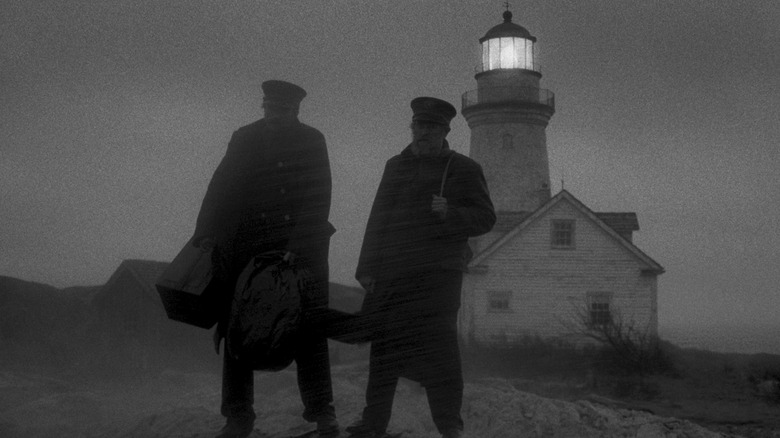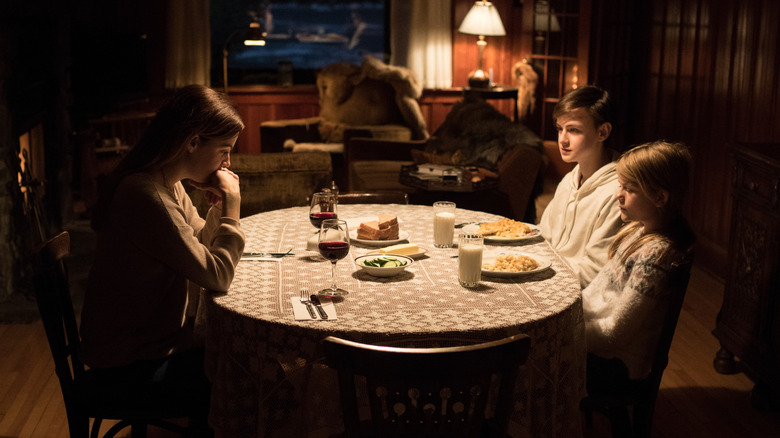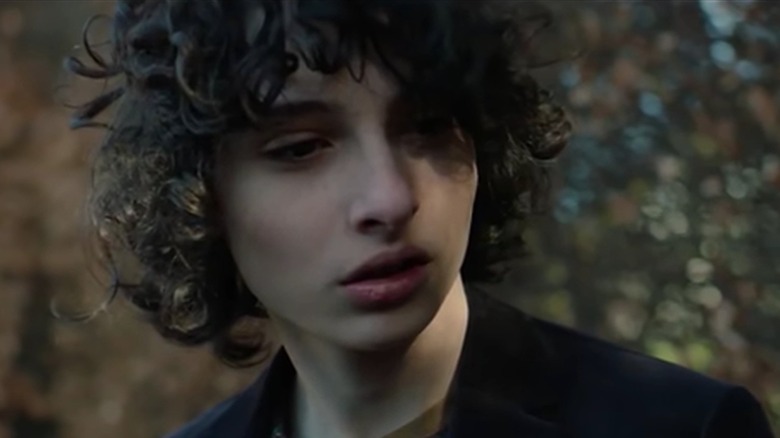30 Scary Movies Like Midsommar You Need To Watch
"Midsommar" is a folk horror movie following a group of American graduate students on holiday in Scandinavia who are invited by a Swedish classmate, Pelle (played by Vilhelm Blomgren), to participate in the mid-summer festival at the remote Swedish commune where he was raised. The vibe of the trip, originally planned as a boys trip for a group of anthropology students, shifts when Christian (played by Jack Reynor) invites his girlfriend Dani (played by Florence Pugh) in a misguided effort to save their floundering relationship after the unexpected death of her family.
Despite her chronic depression and crippling anxiety, Dani reluctantly joins the group, hoping a change of pace will improve her fragile emotional state and save her struggling relationship. What starts as a bucolic vacation in the land of the midnight sun soon turns into a nightmare for the outsiders visiting this strange community. The mid-summer festivities are a mysterious series of pagan rituals, revealing this hippie commune to be a murderous cult employing human sacrifices as a fertility ritual.
If you loved this beautiful yet eerie film — the second from "Hereditary" director Ari Aster — we have 30 scary movies you'll want to watch next!
Rosemary's Baby (1968)
Director Roman Polanski's "Rosemary's Baby" is considered by many to be among the best horror movies ever made. If you consider yourself a horror aficionado, you simply must see this film. The story begins with a young couple, Rosemary and Guy (played by Mia Farrow and John Cassavetes), moving into an apartment building rumored to have a connection to witchcraft. Their neighbors Minnie and Roman Castevet (Ruth Gordon and Sidney Blackmer) are as bizarre as the building's reputation. While Rosemary avoids their elderly neighbors, Guy becomes friends with them. When Rosemary becomes pregnant, her paranoia and suspicion grow.
Rosemary becomes convinced the Castavets are part of a Satanic cult who wish to use her baby for their rituals. Like "Midsommar," Polanski's classic is a slow burn, with strange and unsettling occurrences escalating into a nightmarish fever pitch of horror at the end of the film. As film critic Roger Ebert said of this genre masterpiece, "It is a creepy film and a crawly film, and a film filled with things that go bump in the night. It is very good."
The Blood on Satan's Claw (1971)
If you enjoyed "Midsommar," you should check out the foundational folk horror film, "The Blood on Satan's Claw." This film takes place in 17th century England. When Ralph Gower (played by Barry Andrews) disturbs some decomposed remains while plowing the fields, the local teenagers begin behaving strangely, as if they are under a demonic influence. They skip their classes with the local reverend to play in the ruins of a church. Led by Angel Blake (played by Linda Hayden), the children mislead and kill their classmate Mark, and soon lead his sister Cathy — under the guise of playing a game — to the church ruins where they perform a black mass in the name of the demon Behemoth.
It's hard to say if the teenagers performing demonic rites or the religious zealots with pitchforks and torches are the more frightening element of this British cult classic. Like "Midsommar," this film takes place in a remote village, where the locals take part in ritualistic sacrifices, leaving the audience feeling deeply disturbed.
The Wicker Man (1973)
Director Robin Hardy's 1973 horror film "The Wicker Man" is an excellent example of both folk horror and experimental filmmaking in the era of free love, complete with an electric guitar-heavy original score. This visually bizarre film begins when a devout Christian policeman, Sergeant Howie (Edward Woodward) travels to the Scottish community of Summerisle to investigate the disappearance of a girl named Rowan Morrison. When he arrives on the remote island, he is disturbed to find the inhabitants practice pagan rituals, wearing animal head masks and copulating in groups outdoors.
His frustration with the strange community grows when he feels the entire town is impeding his investigation. Sargent Howie's disapproval of their bizarre spiritual beliefs is a key component to the story, much like in "Midsommar." "The Wicker Man" was remade in 2006, but honestly, the original is far better. It is eerie, whimsical, and creepy in equal measures. Christopher Lee is excellent as the eccentric Lord Summerisle, who presides over the annual fertility rituals Sargent Howie has stumbled upon during his nightmarish visit to this isolated little cult.
Suspiria (1977)
Acclaimed Italian horror director Dario Argento is the mastermind behind the 1977 horror film "Suspiria." If you haven't seen this film yet, you have missed out on a visual delight. After American dancer Suzy Bannion (Jessica Harper) arrives in Germany on a stormy night to study ballet at a famed dance academy, she becomes increasingly frightened by the strange occurrences at or associated with the school, like a sudden infestation of maggots in the residence hall and an increasing number of gruesome deaths. When Suzy's friend Sara, another student at the dance school, goes missing, Suzy becomes convinced the academy is run by a coven of witches who use the dancers in their rituals. Like Dani in "Midsommar," Suzy has left America for Europe, only to experience a trip gone terribly wrong.
"Suspiria" is stylish, frightening and visually gorgeous. The use of saturated colors projected on walls, reflections and shadows in the film only heightens the tension and the surreal nature of the story. The original soundtrack by the Italian rock band, Goblin, keeps the audience on edge with screaming guitars and frantic beats. As critic Peter Sobczynski said of the film, "A riot of sound, fury and imagery that somehow managed to come across as both gruesome and poetic, it was unlike anything I had seen before."
The Shining (1980)
Stanley Kubrick's 1980 film "The Shining" is modern Gothic horror, not folk horror, but much like "Midsommar," Kubrick's film feeds off the fear of isolation and a destabilizing uncertainty about what is real. This film is based on Stephen King's best-selling novel of the same name, and has literally terrorized generations, securing its place in horror history. Starring Jack Nicholson as Jack Torrance, Shelley Duvall as his wife Wendy, and Danny Lloyd as their son Danny, the film is set in the isolated and snowbound Overlook Hotel, where the family will act as winter caretakers while Jack writes a novel.
True to Gothic horror conventions, the hotel has a menacing presence that slowly poisons Jack's mind, driving him mad, while his psychic son Danny is traumatized by disturbing visions and creepy little girls walking the halls. "The Shining" terrifies the audience by playing with our senses. The sound of Danny's three-wheeler's tires rolling over the carpets and hardwood floors lulls you into a trance, before elevator doors open and flood the hallway with blood. This film evokes a tremendous amount of anxiety through the real fear of being trapped with a madman stalking you through haunted halls with nowhere to hide.
Children of the Corn (1984)
Yet another film from the terrifying mind of Stephen King, the 1984 film "Children of the Corn" is the original and most frightening in the otherwise dismal series. Linda Hamilton and Peter Horton star as a couple on a road trip who become trapped in an isolated town in Nebraska, after witnessing a murder. The children have formed a cult, led by a child named Isaac, believing everyone over the age of 18 must be killed as a sacrifice to the entity that lives in the corn fields.
"Children of the Corn" is an excellent example of folk horror, sharing themes of ritual sacrifice for fertility and abundance with "Midsommar." Although the film visually looks dated, and was constrained by a low budget (per IMDb), John Franklin's portrayal of Isaac is unnerving. The fear induced by a town filled with children whipped into a religious frenzy and driven to murder is palpable.
The Believers (1987)
The 1987 film "The Believers," starring Martin Sheen, Robert Loggia and Jimmy Smits, is a frightening exploration of a brujeria cult performing child sacrifices in New York City. Cal Jamison (Sheen), a psychiatrist working for the NYPD, is brought in to interview detective Tom Lopez (Smits) who is having a mental breakdown after finding a child murdered in a ritualistic ceremony in an abandoned movie theater. During the investigation, Cal discovers the cult has set their sights on his son, Chris, played by Harley Cross.
This film is at once a procedural crime drama and a horror film about a cult practicing a malevolent version of Latin-American witchcraft. The two stories are also tied together by the main characters, both having recently experienced a traumatic death in their families. Although "The Believers" is a departure from the folk horror genre, the themes of ritualistic sacrifice and the clashing of spiritual beliefs from two cultures connect with "Midsommar" on a thematic level.
The Blair Witch Project (1999)
"The Blair Witch Project" provided a new twist on horror when it came out in 1999, popularizing the found footage narrative device in filmmaking. The horror film was marketed as something that actually happened, which was an effective ploy to intensify the audience's terror. Most people in the audience knew they were watching a horror film and not a documentary, but the found footage concept suspended the disbelief of audiences just enough to make people shriek in the darkness of the theater and lose sleep at home afterwards.
The film itself is deceptively simplistic, having only three characters: college film students who venture into the woods to investigate a local legend, never to be seen again, making "The Blair Witch Project" a folk horror flick and found footage film simultaneously. The shaky camera footage, while the students run screaming through the eerie darkness of the woods, creates a viscerally frightening film experience. If you haven't seen this film yet, you should definitely watch it with all the lights off.
The Village (2004)
M. Night Shyamalan's 2004 movie "The Village" is set in an isolated hamlet surrounded by woods that the residents are forbidden to enter. The community has established a tenuous peace with the creatures who live in the forest. If the villagers stay out of the woods, the entities will stay out of the village. This film is a period thriller, exploring a restrictive, fear-based culture with little room for discovery or individuality. Shyamalan's films are often received with mixed reviews, and this one was no different.
To its credit, the film has an excellent cast, including Sigourney Weaver, William Hurt, Joaquin Phoenix, Bryce Dallas Howard, and Adrien Brody. The cinematography is stunning, the score is haunting (receiving an Oscar nomination), and the film elicits more than a few jolting scares. It seems that "The Village" lost many viewers' admiration with the twist ending, which reveals that the collective traumas the founders have experienced drove them to create their version of utopia in the middle of the woods. Like "Midsommar," Shyamalan's film explores themes of isolation, community control, and the aftermath of personal trauma.
The Descent (2005)
Neil Marshall's 2005 film "The Descent" is a claustrophobic horror exercise about a group of girlfriends on a spelunking expedition that goes horribly wrong when they are trapped by a cave-in and attacked by subterranean predators hidden within the cave system. While this film is much more gory than "Midsommar," the heroine, Sarah (Shauna Macdonald), is struggling emotionally with a similar trauma to that of the latter film's Dani: she is the sole survivor of a car accident that killed her husband and daughter a year earlier.
The themes of trauma and a trip gone wrong certainly link the two movies. The all-female cast gives terrific performances, and the cave system elicits feelings of claustrophobia and panic in the audience. Rotten Tomatoes gave this film an 86% score, so it's definitely worth a viewing if you want to remember why children are afraid of the dark, and the monsters that hide in it.
The Skeleton Key (2005)
"The Skeleton Key" is an excellent example of a Southern Gothic horror film about a young New Orleans hospice nurse named Caroline Ellis (Kate Hudson) who is drawn into a supernatural mystery when she goes to Terrebonne Parish. She is there to care for an elderly man, Ben Devereaux (John Hurt), living in a decrepit plantation house with his wife, Violet (Gena Rowlands). Terrebonne Parish, Louisiana, is a back swamp area where some locals practice Hoodoo, a type of folk magic brought to America by the transatlantic slave trade.
Caroline doesn't believe in Hoodoo, thinking it superstitious nonsense, but her friend Jill (Joy Bryant) is spooked, telling Caroline to get out of there before she starts believing. This film is filled with suspense as strange things happen to Caroline at the plantation house, making her question her beliefs. Like "Midsommar," this film is centered on a young woman in an unfamiliar place, surrounded by spiritual practices she doesn't understand. This film is spooky and haunting, holding the tension until the last moment.
The Sacrament (2013)
Writer/director Ti West's 2013 film "The Sacrament" was inspired by the tragedy of the Jonestown massacre in 1978, while also being a found footage horror film. The movie begins with a two-person crew from Vice News, cameraman Jake (Joe Swanberg) and journalist Sam (AJ Bowen), accompanying Patrick (Kentucker Audley), a fashion photographer, to an unnamed remote location accessible only by helicopter. Patrick wants to visit his sister, Caroline (Amy Seimetz), who is part of a sober living community after struggling with addiction. The trip doesn't go according to plan when they are met by armed guards.
The tension of the film slowly ratchets up to an uncomfortable state of paranoia and fear, as the outsiders start to question the nature of this religious community and its cult-like leader everyone calls Father (Gene Jones). Although the community, Eden Parish, has noble ideals of equality and communal living, the control Father exerts on his followers is frightening. If you know anything about the Jonestown tragedy, you can guess the direction this unsettling film takes. Like "Midsommar," this film is about a group of outsiders, visiting an isolated community, who experience something they hadn't anticipated.
The Invitation (2015)
When Will (Logan Marshall-Green) accepts an invitation to a dinner party from his ex-wife Eden (Tammy Blanchard) in Karyn Kusama's eerie 2015 film "The Invitation," we immediately expect an uncomfortable and awkward night. The tension of the night is increased because Eden's new partner, David, the man she left Will for, is also in attendance. It becomes clear shortly after he arrives that visiting the home he used to live in with his ex-wife and his deceased son is too much for Will. He is on edge, clashing with David (Michiel Huisman), while this dinner party is intended as a reunion of friends who haven't seen each other since Will and Eden's son died two years ago.
During the party, we learn Eden and David, as well as their two random guests, Pruitt and Sadie, met in Mexico visiting a commune. Everyone jokes about it being a cult, but as the night progresses, the tension between the guests and the hosts becomes unbearable. Will believes something bad is going on, but everyone dismisses his feelings, thinking him paranoid, until the tension builds to a violent climax. The true horror of the night, however, is revealed in the final moments of the film — a plot twist too good to spoil.
The Witch (2015)
Writer/director Robert Eggers' 2015 horror film "The Witch" is set in 1630s New England and based on historical court accounts of witchcraft accusations, as well as New England folktales about witches who dance naked in the woods, make pacts with the devil, kill babies and enchant children into evil behavior. This is an authentic period film, with old-fashioned language, immersed in the puritanical culture of colonial New England. The story centers on a family who, after being banished from the relative safety of their walled village, cobbles together a life out near the edge of a sinister forest.
Their peace is disturbed when their baby is stolen — while being watched by the eldest child — right before being baptized. The family's extreme obsession with their religion sends them into hysteria, turning their paranoia and mistrust toward each. Anya Taylor-Joy is excellent as Thomasin, the eldest daughter. The fear, paranoia and isolation this family experiences are palpable. Ideas about family trauma, clashing spiritual practices, authoritarian communities, human sacrifice and resilience link this film with "Midsommar" thematically.
A Dark Song (2016)
"A Dark Song" is an exploration of a mother's grief and the healing power of ritual. Writer/director Liam Gavin's 2016 film is about a young mother trying to go on with life after experiencing the trauma of her child being tragically murdered. When Sophia Howard (Catherine Walker) rents an isolated house in Wales, she convinces occultist Joseph Solomon (Steve Oram) to help her perform an esoteric months-long ritual to summon her guardian angel, so she can speak to her son again.
Many of the rituals are dark and emotionally trying, but there are also moments of beauty. It is unclear if the rituals are working, leading to an altercation between Solomon and Sophia in which he accuses her of being dishonest about her intentions. She confesses that her desire is to ask the angel for vengeance on the people who killed her child. Solomon performs a baptismal rite, essentially drowning Sophia before bringing her back, and they continue forward even after he is injured during a subsequent argument.
Like many horror films where the characters have succumbed to madness from isolation, it's unclear what is real and what isn't, but like "Midsommar," it ends with the audience feeling our heroine has turned a corner, finally moving forward on her journey toward healing.
A Cure for Wellness (2016)
"A Cure for Wellness" is a mind-bending film from the director of "The Ring," Gore Verbinski. The film was inspired by the Thomas Mann novel "The Magic Mountain," which Mann began writing while visiting his wife in a sanitarium in the Swiss Alps. When Lockhart (Dane DeHaan), an ambitious young executive, is sent to take home the CEO of the company he works for from a mysterious sanitarium in Switzerland, he is drawn into the mystery of what is really going on at this idyllic but strange place.
The film was a box office bomb (per Box Office Mojo), but was praised for the cinematography and performances while criticized for the extremely long running time. Regardless of criticism, the psychological horror film is eerie, unsettling and visually seductive, much like "Midsommar." New York Times film critic A. O. Scott called the stylish film "a lustrous box of genre candy, the self-revealing work of an auteur who has laid bare not so much his psyche as his online streaming queue."
The Ritual (2017)
Netflix original "The Ritual" is a folk horror film steeped in the Norse mythology of Sweden, complete with a mysterious reindeer-like monster and a creepy group of people isolated in the woods that give off major witchy "I cook children in an oven" vibes. When a quartet of male friends from the UK go on a hiking trip in Sweden as a memorial for their friend, who died six months earlier in a liquor store robbery gone wrong, things don't go as planned. Dom (played by Sam Troughton) twists his ankle on the second day, leading the group to abandon the safe hiking trail for a shortcut through the woods.
The woods are silent, dark and deep, leading the men into a "dark night of the soul" ordeal that tests their fractured friendships, breaking both bodies and minds. In particular, central character Luke (Rafe Spall) must confront the guilt he carries for not attempting to save his friend Robert during the robbery. Much like Dani in "Midsommar," the trauma Luke experiences during his hiking-trip-turned-nightmare is a catharsis of sorts, leaving him shaken but strong.
Mother! (2017)
Writer/director Darren Aronofsky is no stranger to controversy, and his 2017 psychological horror film "Mother!" certainly created a stir with its surreal atmosphere, abrupt violence and allegorical storyline. The film stars Jennifer Lawrence and Javier Bardem as a couple living in bliss at the secluded country home that Lawrence's character, named Mother in the credits, has lovingly restored.
Their tranquility is disturbed when a man, played by Ed Harris, comes to their door, followed shortly after by his wife, played by Michelle Pfeiffer, who comes to join her husband. When Bardem's character, a poet experiencing writer's block who is only known as Him, invites them to stay, the peaceful home is invaded by more strangers, including the two sons of the man and woman. "Mother!", like many of Aronofsky's films, is chaotic, eliciting feelings of discomfort and panic in the audience as the couple loses control of their home. It is a truly bizarre film replete with themes of isolation, narcissism and patriarchal abuse.
Get Out (2017)
"Get Out" was writer Jordan Peele's directorial debut, and he won an Oscar for writing the film's original screenplay. "Get Out" was both a box office success and a critically acclaimed genre outing. Chris Washington (Daniel Kaluuya) travels with his girlfriend Rose Armitage (Allison Williams) to visit her parents. Chris is anxious about how her parents will respond to her bringing a Black boyfriend home despite her insistence it won't be an issue for her progressive parents.
After allowing Missy (Catherine Keener), Rose's hypnotherapist mother, to hypnotize him to cure his smoking addiction, Chris' discomfort with the family quickly grows into full-blown paranoia when he becomes convinced something sinister is at work in this tight-knit, affluent community in upstate New York. Chris' paranoia is soon revealed to be justified, as we learn what Rose's parents are up to and that their sights are set on Chris next. "Get Out" is a must-see horror film that taps into the same dread of isolated communities as "Midsommar" while also tackling explosive cultural questions.
Climax (2018)
Gaspar Noé's "Climax" is a French horror film set in 1996 about a group of dancers who meet for a number of wintry days and nights in an empty school building to rehearse. The afterparty on the last night quickly turns into a nightmare when they discover the sangria was laced with LSD. The film takes on a fever-dream quality, leaving the audience uncertain if they are watching mass hallucinations or real, violent and terrifying events.
According to an interview with Noé in Candid, the film was shot in only 15 days and is heavy on improvisation, with no script. Nearly all the actors and actresses in the film are dancers who had never acted before, except for Sofia Boutella (Selva) and Souheila Yacoub (Lou), who both had prior acting experience in addition to dance training. If you are looking for a film that visualizes the effects of altered states of consciousness, this is your kind of horror movie.
Apostle (2018)
Netflix's "Apostle" is a period horror film set in 1905 in the UK. When Thomas Richardson (Dan Stevens) returns home from China where he was believed to be dead, he learns that a cult has kidnapped his sister Jennifer (Elen Rhys) and is holding her for ransom. Determined to get his sister back, Thomas travels to the remote Welsh island where the cult has taken Jennifer. On the island, Thomas infiltrates the community posing as a new convert, quickly meeting Malcolm (Michael Sheen), who founded the cult with Frank and Quinn. After a newcomer attempts to assassinate Malcolm, injuring Thomas instead, Malcolm becomes certain there is another intruder on the island.
As the tension mounts, it becomes clear the leadership of the cult is crumbling, with Quinn usurping control after killing his daughter and Frank's son. Thomas tries to find his sister while evading capture, thanks to help from Malcolm's daughter. Thomas becomes privy to some of the cult's darker rituals, like force-feeding blood sacrifices to the deity of the island. This scary Netflix film shares themes of isolation and ritualistic pagan sacrifices with "Midsommar" and it has a great twist at the end that can't be missed!
Hereditary (2018)
If you loved "Midsommar," you should check out writer/director Ari Aster's first feature, "Hereditary," a meditation on grief and family secrets. When Annie's (Toni Collette) mother Ellen passes away, Annie struggles with her grief and the complex relationship she had with her secretive mother. The family's grief increases when Annie's daughter, Charlie (Millie Shapiro), is killed in a car accident while her older brother, Peter (Alex Wolff), was driving her to the hospital during an episode of anaphylaxis.
After Charlie's death, Annie meets a woman named Joan (Ann O'Dowd) at a grief support group. Joan teaches Annie how to contact Charlie in the spirit realm during a seance, setting off an unexpected chain of events within her family. Strange things start happening around their house as Annie learns more about the hidden relationship between her mother and Joan, while Peter is plagued by supernatural forces. The scope of what Annie's family is unwittingly involved in is only revealed in the last, mind-blowing moments of this scary film, which demonstrated that Aster already had an amazing instinct for how to terrify viewers.
Unsane (2018)
As reported by Variety, director Steven Soderbergh's film "Unsane" was shot on an iPhone in secret, before premiering at the Berlin International Film Festival in 2018. The film centers on Sawyer Valentini (Claire Foy), a young woman who moves because she is being stalked. Sawyer makes an appointment with a counselor because she is still struggling emotionally, thinking she sees her stalker everywhere despite knowing logically he isn't there. During her counseling appointment she inadvertently commits herself for observation for 24 hours, which expands to seven days after she has a violent outburst. Sawyer begins seeing the man who stalked her working as an orderly in the facility, but her complaints are disregarded as paranoid delusions by the staff.
With any film about involuntary commitment, we are led to wonder if Sawyer has lost her grip on reality, or if she is in fact living this nightmare. What is interesting about this film is how Sawyer's doubt slowly creeps in. Before entering the institution she's confident in her sanity, only wanting support and help recovering from trauma, but by the end of the film her confidence is shaken and in the last moments it is clear she is unsure if she can trust herself anymore. Another interesting element in this film is the side plot of insurance fraud being carried out by the staff at the facility, adding a mystery-crime aspect to the story.
If you or someone you know is struggling with mental health, please contact the Crisis Text Line by texting HOME to 741741, call the National Alliance on Mental Illness helpline at 1-800-950-NAMI (6264), or visit the National Institute of Mental Health website.
Us (2019)
If you haven't seen writer-director Jordan Peele's second foray into horror, you have missed out. In the tradition of "Midsommar," this film centers on a vacation gone terribly wrong. "Us" follows the Wilson family during their vacation to Santa Cruz, California, where Adelaide Wilson (Lupita Nyong'o) had a traumatic experience in a boardwalk funhouse as a child. Adelaide finally tells her husband Gabe (Winston Duke) about what happened to her as a child, only to be interrupted by their son, Jason (Evan Alex) saying there is a family standing in their driveway. What's supposed to be an idyllic beach vacation turns into a violent ordeal when the family's doppelgängers appear in their driveway to torment and hunt them.
The family escapes to their friends' lavish beach house, but when they arrive, they discover the other family has been killed by their own doppelgängers — revealing this aggression is happening elsewhere. This film is intensely suspenseful, with a poignant commentary on marginalized Americans who have lost their voice within our culture. It also addresses the history of unethical science experiments carried out on people of color in the U.S. We don't want to ruin any of the twists, but suffice to say they are plentiful and thought-provoking.
Ready or Not (2019)
In "Ready or Not" Grace (Samara Weaving) is thrilled to be having her wedding at her fiancé Alex's beautiful family estate. After a lavish celebration, Alex (Mark O'Brian) tells Grace there is a family tradition of playing a game at midnight that officially makes her part of the family. Grace draws the "hide-and-seek" card, and begins looking for a place to hide. But unbeknownst to Grace, the family arm themselves before beginning their search. Alex reveals that his family must kill her before sunrise or the family curse will strike them dead.
"Ready or Not" is a bit of a departure from "Midsommar" in that it is a horror comedy, but the two films share the theme of going somewhere beautiful expecting a celebration, only to become embroiled in a deadly ritualistic sacrifice. Grace being a product of the foster system also adds an interesting element to the film. The lengths she goes to be part of a family certainly makes us contemplate the games some people are willing to play and the sacrifices we are ready to make for love, especially when we grew up without a family. Both Grace and Dani from "Midsommar" are two young women who are essentially alone in the world. Both women cling to a man they believe might save them, but they both come out of their ordeals stronger and more dependent upon themselves.
Vivarium (2019)
"Vivarium" is a bizarre film with major "Twilight Zone" vibes, about a young couple who meet with a real estate agent named Martin (Jonathan Aris) while looking for a home to buy. Martin takes them to a creepily uniform suburb called Yonder. While looking at house Number 9, Martin asks if they have any children, with Gemma (Imogen Poots) telling him no. After looking at the backyard, the couple is dismayed to find Martin gone when they return. They attempt to leave the neighborhood, driving in circles only to end up back at Number 9 repeatedly until they run out of gas. They sleep at the house, still finding themselves unable to leave Yonder on foot the next day.
The frustration Tom (Jesse Eisenberg) and Gemma feel while trapped in Yonder is palpable, making one think of being in an ant terrarium, or a maze. Although it was made before COVID-19, watching it during quarantine adds an interesting element to the viewing experience, intensifying the feelings of claustrophobia and frustration. The ending of the film also introduces the idea of being trapped in a loop, unable to change anything. If you like science fiction and mind-bending, time-travel paradox films, this might be a good fit for you!
Daniel Isn't Real (2019)
In "Daniel Isn't Real," a young boy named Luke walks into a coffee shop that has just been the scene of a mass shooting, where he sees another boy across the room and they become friends. No one else can apparently see Daniel, but after he convinces Luke to do something that almost kills his mother Claire (Mary Stuart Masterson), Daniel is banished by symbolically locking him in a doll house at Claire's request. Years later, when Luke (Miles Robbins) is in college, he opens the doll house and Daniel (Patrick Schwarzenegger) appears. Like before Daniel helps Luke, but soon Daniel becomes aggressive, pushing Luke to do things he doesn't want to do.
This film is an exploration of the darker aspects of human nature, and the things that drive us to do unspeakable things. Like many horror films it plays with our perceptions, making us question if Daniel is a real entity or a part of Luke that he is unwilling to recognize or accept. As Luke begins to fear he is schizophrenic like his mother, the intensity of this psychologically disturbing film increases, leading Luke to discover Daniel's true origins. Like "Midsommar," this isn't a gory slasher movie, but it's scary because it preys on our innate fear of insanity. This film was fascinating and the performances are excellent, earning an 84% score on Rotten Tomatoes.
The Lighthouse (2019)
"The Lighthouse" is brought to us by the director of "The Witch," Robert Eggers, who co-wrote the script with his brother. Like its predecessor, this film explores the madness of isolation, but this time through two lighthouse keepers trapped on a remote island in the late 1800s. This film is an acid dream in black and white, starring Robert Pattinson and Willem Dafoe. Ephraim Winslow (Pattinson) accepts a position for a month assisting a lighthouse keeper, Thomas Wake (Dafoe), but their relationship quickly becomes strained because of Wake's abrasive behavior. After a storm hits, the two men are stuck together in the compound, where they drink excessively and quickly devolving into a shared mistrust and contempt.
As in many films about madness and isolation, the lines between reality and fantasy are blurred. Winslow begins hallucinating shortly after arriving on the island, and Wake (Dafoe) seems crazy to begin with. Eggers is terrific at eliciting feelings of discomfort in his audience and while watching "The Lighthouse" is not a viscerally pleasant experience, the performances are excellent. This darkly disturbing film was greeted with critical acclaim and has a 90% rating on Rotten Tomatoes, proving it is worth your time.
The Lodge (2019)
After Richard Hall (Richard Armitage) tells his estranged wife, Laura (Alicia Silverstone), that he plans to marry another woman, she kills herself. Months later, Richard takes his children, Mia (Lia McHugh) and Aiden (Jaeden Martel), to the family's isolated cabin for Christmas, hoping they will get to know his fiancé Grace (Riley Keough). Richard leaves Grace and the children alone while he heads back to the city for work, but the siblings dismiss Grace's attempts to become friends while discovering that she is the only survivor of a doomsday cult that took their own lives years earlier. A series of strange events — including the disappearance of all her belongings and her dog — push Grace off balance, leading her to question her sanity and veer toward a breakdown.
Themes of isolation, trauma and ritual sacrifice thematically link this to "Midsommar." But in "The Lodge" Grace is broken down and pushed over the edge, not finding catharsis and healing as Dani does in "Midsommar." Grace is a victim of gaslighting that serves to weaponize her traumatic past and use it against her. While Dani is drawn into participating in pagan rituals she is troubled by, she is ultimately freed from her misery, rather than broken by her ordeal. Where "The Lodge" is about victimization, "Midsommar" is oddly ... empowering.
The Turning (2020)
This atmospheric adaptation of Henry James' 1898 novella, "The Turn of the Screw," follows a young nanny named Kate (Mackenzie Davis) who leaves her mentally ill mother for her first live-in position as a nanny at an isolated country estate, where she will care for an orphan named Flora (Brooklynn Prince). When Flora's troubled older brother Miles (Finn Wolfhard) is sent home from boarding school after a violent incident, Kate becomes increasingly uncomfortable in the spooky mansion. Miles' presence is menacing, and his attention unwelcome.
As inexplicable incidents occur in the house, Kate's grip on reality begins to slip, keeping us guessing whether Kate is mentally ill like her mother, if the house is haunted by Flora's former nanny, Miss Jessel, or if the children are playing with Kate's mind. This adaptation of James' story is stylish and dark, while Netflix's "The Haunting of Bly Manor" is a more melancholy and haunting incarnation of the same classic tale. If you love haunted houses, and films that elicit fear through suspense rather than gore, "The Turning" is worth checking out.
